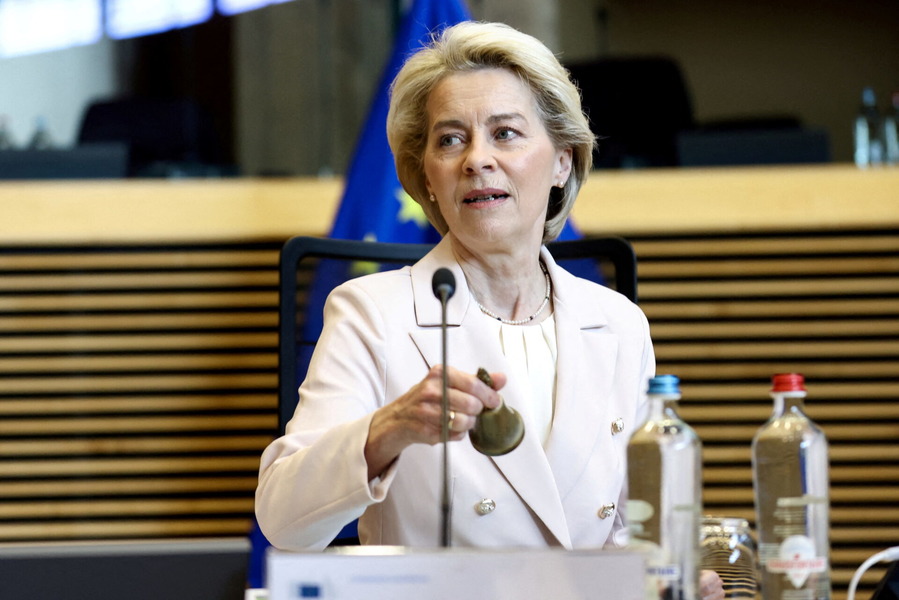LONDON — The European Commission is discussing ways to use frozen Russian central bank assets to rebuild Ukraine and hopes to put forward a proposal soon, the body’s president, Ursula von der Leyen, told Nikkei.
«I am of the strong opinion that Russia must pay for the cost of the massive destructions it has provoked in Ukraine,» von der Leyen said on Thursday in an email interview. In an extraordinary turn of events at the weekend, the leader of the mercenary Wagner Group employed by President Vladimir Putin to attack Ukraine staged a mutiny and threatened to march to Moscow before dramatically changing his mind.
The head of the executive branch of the European Union did not respond to a request for further comment on the weekend’s events. However, the EU’s foreign policy head, Josep Borrell, told reporters on Monday that Wagner’s moves reflect a «monster acting against its creator» and that Russia’s «political system is showing its fragilities and the military power is cracking.»
Since Russia began its invasion of Ukraine in February 2022, the EU and G7 partners have blocked about 300 billion euros ($328 billion) of Russian central bank assets in their territories as part of a sanctions package.
With the World Bank estimating that Ukraine will need $411 billion to rebuild over a decade, allies in Europe — where most of these assets are held — have been exploring ways to utilize the assets of Russian oligarchs and the Russian central bank for Ukraine.
«We need very solid legal tools to be able to use Russian public assets to rebuild Ukraine,» von der Leyen said, adding that discussions are ongoing and that the EC will put forward a proposal soon. In a speech in London on June 21, she specified that the EU is looking at using proceeds generated by those assets, but her written answer above seems to suggest she has not ruled out the possibility of using the assets themselves.
Around 734 million euros worth of interest was accrued in the first quarter of 2023 from just the cash balance of frozen assets held at Euroclear, a settlement house with 36.4 trillion euros worth of sanctioned Russian assets. Deploying such proceeds, though, would require complicated legal instruments.
The European Central Bank has warned that seizing bond payments owed to the Russian central bank could dent investor confidence in euro-denominated assets and the euro itself.
«The implications could be substantial: It may lead to a diversification of reserves away from euro-denominated assets, increase financing costs for European sovereigns and lead to trade diversification,» according to a draft internal EU note seen by the Financial Times. Berlin has also since voiced opposition to such plans.
Another option is to seize the assets for use, another highly divisive and legally complex move that could have wider implications for the future of assets held in the EU in general.
Russia’s invasion of Ukraine has shown the chaos that can be unleashed when a bigger autocratic power is left unchecked. Von der Leyen said in the email that the EU and Japan are aiming to «upgrade» their security cooperation, in a sign of Europe’s increasing interest in the Indo-Pacific and recognition of linked defense issues in facing belligerent powers like China.
While the West united to support Ukraine against Russian aggression, leading countries are more muted in their support for Taiwan. Chinese Premier Li Qiang visited France and Germany last week and, notably, the leaders of the EU’s two largest member states avoided public discussion of Taiwan.
But von der Leyen was clear on the EU’s position as a bloc: «We oppose any unilateral change of the status quo especially by force.»
She said, «Our priority is to support all efforts to ensure that peace and stability is maintained in the Taiwan Strait,» adding that she spoke to Chinese President Xi Jinping about Taiwan during her visit to Beijing in April.
In the face of a more assertive Beijing that has declared a «no limits» relationship with Moscow, Europe’s attitude toward Asia has shifted, with increasing interest in strengthening relations with like-minded partners such as Japan.
Several EU member states have been visible in their maritime engagement in the region: France and Germany have in recent years sent naval ships to the Indo-Pacific. Italy’s latest warship, the Francesco Morosini, is undertaking an Indo-Pacific tour and docked in Yokosuka last week, becoming the first Italian Navy asset to anchor at a Japanese port in 27 years.
The EU sees Japan as a key Asian partner, having signed a Strategic Partnership Agreement in 2018. Von der Leyen will host the 29th EU-Japan Summit on July 13 in Brussels, an event she described as «an important occasion» to «take stock» of the strategic partnership.
«We aim to upgrade our security cooperation,» she said, adding that economic security is an area where ties will deepen will increase. This could mean regular high-level dialogue in defense and security with Japan.

